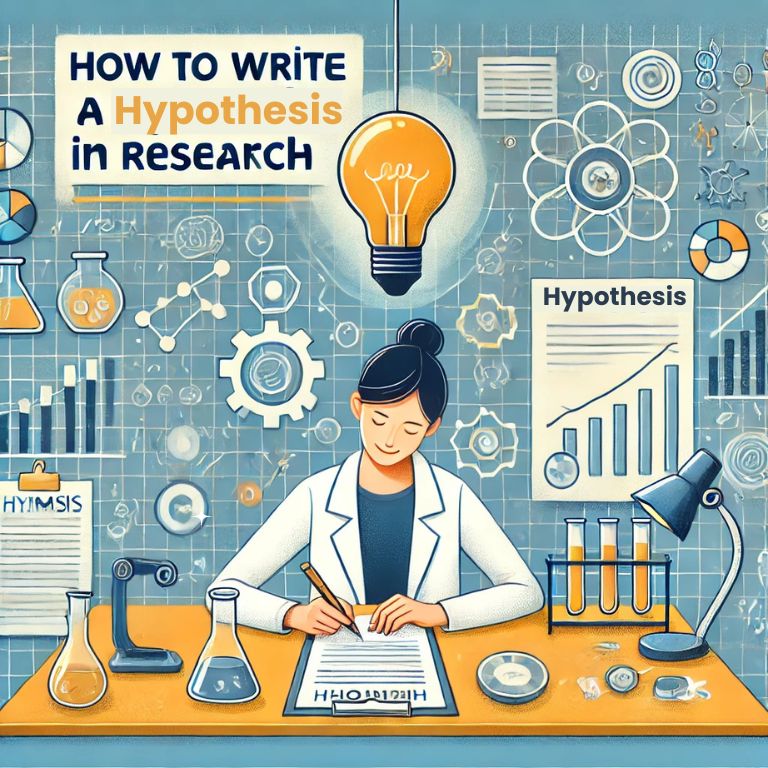Introduction:
Writing a clear and testable hypothesis is a critical step in any research process. A well-formulated hypothesis provides direction and focus to the research, allowing the researcher to test specific assumptions or predictions. If you’re unsure how to write a hypothesis in research, this guide will walk you through the key steps, from understanding the different types of hypotheses to writing a testable one. Moreover, tools like MyWordAi.com, powered by ChatGPT, make the process much easier, helping researchers generate strong hypotheses without needing advanced AI prompting skills.

Understanding the Basics of a Research Hypothesis
A hypothesis is a tentative statement that proposes an explanation for a phenomenon or a prediction about the relationship between variables. It differs from a research question in that a hypothesis makes a specific, testable prediction, whereas a research question focuses on identifying the issue or subject for exploration.
A good hypothesis must be testable and measurable. It helps researchers define what they expect to find in their studies. Without a hypothesis, it’s easy to lose focus on the research goals. Hypothesis development is therefore crucial for ensuring that a study remains clear and objective.
How to Write a Hypothesis in Research: Steps to Write a Strong Hypothesis
- Identify the Research Problem or Question: Start by identifying the core research question. A good hypothesis always revolves around a problem or query that the researcher wants to solve.
- Conduct Preliminary Research: Gather background information to understand the topic better. A deep understanding of the subject allows for a more precise and well-informed hypothesis.
- Create a Conceptual Framework: Outline the relationships between the variables you’re studying. This framework will help shape your hypothesis.
- Formulate the Hypothesis: Once you have enough background information, write your hypothesis. A hypothesis typically follows the “If X happens, then Y will occur” structure.
For example, a hypothesis could be: If students receive personalized tutoring, their academic performance will improve. This is a clear, testable statement that links a cause (personalized tutoring) to an effect (improved academic performance).
By following these steps, you can develop a hypothesis that is both clear and research-driven.
Types of Hypotheses
There are several types of hypotheses that researchers use depending on the study’s objectives. Understanding these can help in hypothesis development.
- Null Hypothesis (H0): The null hypothesis states that there is no relationship between the variables being studied. For instance, “There is no significant difference in exam scores between students who study in the morning and those who study at night.”
- Alternative Hypothesis (H1): The alternative hypothesis suggests that there is a relationship or effect. For example, “Students who study in the morning perform better on exams than those who study at night.”
- Descriptive Hypothesis: A hypothesis that predicts characteristics of a phenomenon without trying to determine cause-and-effect relationships. For example, “Most customers prefer online shopping over physical stores.”
- Causal Hypothesis: A hypothesis that predicts cause-and-effect relationships between variables. An example is, “Regular physical exercise reduces the risk of heart disease.”
- Directional vs. Non-Directional Hypothesis: A directional hypothesis predicts the direction of the relationship between variables (e.g., “A will increase B”), while a non-directional hypothesis simply suggests a relationship without specifying the direction.
How to Write a Hypothesis in Research: Writing a Testable Hypothesis
A good hypothesis should be specific, measurable, and clearly written. It should be focused on a narrow issue that can be tested with empirical data. For example, “Increasing the frequency of employee feedback improves job satisfaction” is both specific and testable.
Here are a few tips to ensure your hypothesis is testable:
- Use clear, concise language
- Identify the independent and dependent variables
- Ensure the hypothesis is measurable, either qualitatively or quantitatively
Tools like MyWordAi.com make it easier to generate testable hypotheses. By leveraging AI technology, MyWordAi assists researchers in crafting precise, research-ready hypotheses without needing in-depth knowledge of AI prompting.
Hypothesis Testing and Refinement
Once a hypothesis is written, the next step is testing it through experiments or statistical methods. This is crucial for determining whether the hypothesis is supported or refuted by the data. Popular methods for hypothesis testing include t-tests, ANOVA, and regression analysis.
If the hypothesis is supported, it may become a foundation for further research. If not, researchers often refine or adjust the hypothesis based on the results.
This refinement process can be made significantly easier using automated tools like MyWordAi.com, which can help researchers iterate quickly on their hypotheses, thanks to its built-in AI capabilities.
Tools for Writing Hypotheses
One of the most efficient ways to write a hypothesis is to use automated academic writing tools like MyWordAi.com. Powered by ChatGPT, MyWordAi assists researchers in generating hypotheses, structuring research, and ensuring academic rigor in their writing.
By using MyWordAi, researchers no longer need to learn the intricacies of AI prompting. Simply input your research topic, and the tool will generate well-structured, testable hypotheses, saving both time and effort.
Download MyWordAi from the Google Play Store to get started on your research journey today.
Conclusion:
In conclusion, writing a hypothesis in research is a crucial step that helps guide your study’s focus and outcomes. By following the outlined steps, understanding the types of hypotheses, and ensuring your hypothesis is testable, you can create a solid foundation for your research. For added ease and efficiency, consider using MyWordAi.com to streamline the process. Download the MyWordAi app today to enhance your academic writing and research experience.
Get started on your research now with MyWordAi.com. Download it today from the Google Play Store and simplify your academic writing!